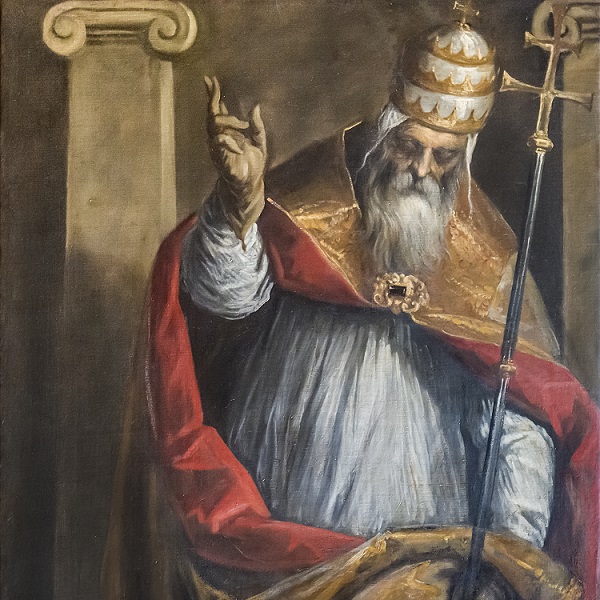"Remember your leaders who spoke the word of God to you. Consider the outcome of their way of life and imitate their faith." (Hebrews 13:7)
The Third Bishop of RomePope Saint Anacletus (also known as Cletus) holds an honored place in Catholic tradition as the third Bishop of Rome, following directly after Saint Linus and before Saint Clement I. Though historical details about his life and papacy remain limited, the significance of his leadership during the formative years of Christianity cannot be overstated. Serving approximately from 76 to 88 AD, Anacletus guided the Church through the tumultuous period of Roman persecution following the apostolic age.
Greek Origins in the Eternal CityAccording to ancient tradition, Anacletus was born in Athens, Greece—making him among the earliest popes to come from the Hellenic world. His Greek heritage represents the universal nature of the early Church, which transcended cultural and ethnic boundaries from its inception. That a Greek would shepherd the Roman Church demonstrates the truly catholic (universal) character of Christianity, uniting East and West under one faith.
Ordained by Saint Peter HimselfWhat particularly distinguishes Anacletus in Catholic tradition is his direct connection to the Prince of the Apostles. According to the Liber Pontificalis, an ancient book of papal biographies, Anacletus was personally ordained to the priesthood by Saint Peter. This apostolic pedigree placed him in the living chain of succession that Catholics cherish as the guarantee of authentic teaching authority.
Strengthening Church StructureAnacletus served during a critical period when the Church was transitioning from its apostolic foundations to establishing enduring ecclesiastical structures. Ancient sources attribute several important developments to his papacy:
He is believed to have divided Rome into twenty-five parishes or "titles," each with its own priest, establishing the parochial system that would become a hallmark of Catholic pastoral care Tradition holds that he ordained a significant number of priests, ensuring sacramental ministry would continue despite persecution He is credited with establishing the practice of having bishops consecrated by at least three other bishops, a tradition that continues to this dayThe Tomb of Saint PeterPerhaps Anacletus's most enduring physical legacy was his reported construction of a memorial shrine (memoria) over Saint Peter's burial place on Vatican Hill. This act of reverence for his predecessor would eventually lead to the construction of the magnificent St. Peter's Basilica that now stands as the heart of Vatican City. In honoring Peter's martyrdom, Anacletus reinforced the importance of apostolic succession and the primacy of the Roman See.
Martyrdom for the FaithLike many early popes, Anacletus is venerated as a martyr who gave his life for the faith during the reign of Emperor Domitian. Though details of his martyrdom are not preserved in historical records, the Church honors his ultimate sacrifice as the highest expression of faithfulness to Christ. His feast day is celebrated on April 26th, a day when Catholics commemorate his holy witness.
Preserving Apostolic TraditionWhat makes Pope Saint Anacletus particularly significant in Catholic understanding is his role in preserving and transmitting apostolic teaching during a crucial transitional period. As someone who likely knew those who had personally encountered Christ, he represents a vital link in the chain of tradition stretching from Jesus Himself to the present day.
The Catholic Church values this unbroken lineage of teaching authority as a safeguard against doctrinal innovation and a guarantee of authentic interpretation of Christ's message. In Anacletus, we see an essential guardian of the deposit of faith during Christianity's formative decades.
A Model of Steadfast LeadershipDespite persecution and the challenges of leading a religious minority, Anacletus guided the Church with steadfast determination. His papacy exemplifies faithful leadership during difficult times—a model that continues to inspire Catholics facing adversity around the world today.
Though lacking the extensive biographical details we possess about later popes, Saint Anacletus stands as a testament to those countless faithful shepherds who, without fanfare or historical recognition, have sustained the Church through their quiet dedication.
The Legacy of Apostolic SuccessionWhen Catholics today speak of apostolic succession—the unbroken line of episcopal authority extending from the apostles to present-day bishops—they recognize figures like Anacletus as essential links in this sacred chain. His papacy helped establish the pattern of orderly succession that would safeguard doctrinal continuity throughout the centuries.
This succession represents more than mere organizational continuity; it embodies the Church's living connection to its origins and Christ's promise to remain with His Church "until the end of the age" (Matthew 28:20).
ConclusionPope Saint Anacletus may not be among the most widely recognized saints in Catholic devotion, but his contribution to the early Church's development and stability deserves profound appreciation. As the faithful guardian of apostolic teaching during Christianity's perilous beginnings, he helped ensure that the flame of faith would endure through centuries of challenge and change.
In venerating Saint Anacletus, Catholics honor not only his individual holiness but also the divine providence that has guided the Church through every generation since Christ walked the earth. His papacy reminds us that the Church is built not merely on human wisdom or effort, but on Christ's abiding presence working through those He calls to leadership.
As we face the challenges of living our faith in the modern world, Pope Saint Anacletus invites us to trust in the Lord's guidance of His Church and to remain steadfast in preserving the faith handed down to us through the centuries.
"What you heard from me, keep as the pattern of sound teaching, with faith and love in Christ Jesus. Guard the good deposit that was entrusted to you—guard it with the help of the Holy Spirit who lives in us." (2 Timothy 1:13-14)

Please or Login to leave Comments